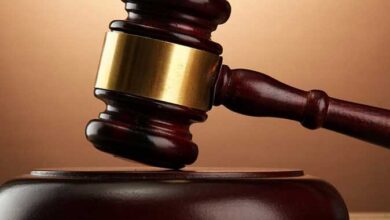When the country’s top prosecutor, Abdel Meguid Mahmoud, faced down President Mohamed Morsy to hold on to his post last month, it seemed at first like the Hosni Mubarak-era appointee had landed the decisive blow — he was going to stay, and that was that.
But, after Mahmoud rejected what some see as an offer for a safe exit, in the form of an undemanding and low-profile diplomatic job as ambassador to the Vatican, he ended up sparking a fresh political campaign to push him to resign.
Mahmoud refused to leave his position, citing the law that states that the head of the public prosecution is immune to dismissal and may only relinquish his or her position by choice.
The public prosecution has other tools to hit back at political opponents. The office both files criminal charges on behalf of the state, and has the authority to initiate its own investigations and prosecutions. As well as investigating allegations of crime, they have the power to issue search warrants and order the imprisonment of a suspect for up to four days before trial.
Mahmoud managed to present himself as an icon for the independence of the judiciary. Large numbers of junior and senior judges flocked to the press conference organized by the Judges Club, headed by Ahmed al-Zend, another former regime figure. Mahmoud emphatically rejected the executive authority’s intervention in the work of the judiciary.
Three days after the conflict erupted, members of Monitors Against Corruption, a movement established by a group of employees from the Central Auditing Organization, started leaking news that members of the organization were in the process of examining the chief prosecutor’s dossier.
Then the media started circulating statements by Essam al-Erian, a Brotherhood leader and, at the time, presidential adviser, claiming the president’s office had recorded phone conversations with Mahmoud in which he had agreed to step down.
Mahmoud hit back, saying such recordings would be illegal without a court order, and opening an investigation into the claims. Shortly afterward, also following his loss in an election for the post of chair of the Freedom and Justice Party, Erian resigned as presidential adviser to prevent any “embarrassment” to Morsy, according to Brotherhood figures quoted by media at the time. Meanwhile, Erian was referred by Mahmoud to court earlier this month on libel and slander accusations as the FJP leader alleged that a TV host was receiving money to attack the Brotherhood.
Commenting on Erian’s statements, Mohamed al-Damaty, a member of the Lawyers Syndicate board, suggests that the public prosecutor did not officially submit a resignation, but expressed such a desire in four phone conversations with the president’s office.
Damaty expresses reservations over the idea of piling pressure on members of the judiciary, and denies that Mahmoud was offered a safe exit.
He says Mahmoud expressed a desire to leave his position, but did not submit an official document to that end. Since it was Mahmoud who wished to resign, then, he concludes, he was not offered a safe exit as alleged.
Meanwhile, political escalation against Mahmoud continues, with Jama’a al-Islamiya, its political arm, the Construction and Development Party, and some Salafi activists launching a campaign to push for his removal or force him to resign. This campaign started on 31 October with a protest in front of his office.
The protesters say they will begin a nationwide campaign to organize protests against Mahmoud.
Law professor Rafaat Fouda says some political groups rallied around Mahmoud to defend the principle of the independence of the judiciary.
Fouda diagnoses the current crisis as a settling of scores between Mahmoud and Islamists, who blame Mahmoud for their years of imprisonment and torture, although the sentences they were given are technically the responsibility of the judges who examined their cases, not the prosecution.
This Islamists-judiciary rift aside, the conflict is simmering. On the same day that members of Jama’a al-Islamiya staged a protest in front of Mahmoud’s office, 47 liberal and leftist parties issued a joint statement condemning pressure on the judiciary and rejecting calls for Mahmoud to resign.
The same day, the Judges Club issued a statement that said judges were furious over calls for Mahmoud to resign.
But calls for his departure predate the 25 January revolution, and were made by liberal and rights activists who are not part of the current conflict, including Gamal Eid, the director of the Arabic Network for Human Rights Information.
“We called for the departure, and not the dismissal, of the public prosecutor,” says Eid, adding that there should be no intervention in the judiciary, even though it is not independent.
He calls for Mahmoud to resign since there are no assurances that justice will be observed under his authority. Mahmoud held a long-term association with the Mubarak government and many cases put against former Mubarak-era figures, including the defendants in the Battle of the Camel trial accused of killing protesters in February 2011, have been perceived to be weak.
Mahmoud Radwan of Lawyers against Corruption says he thinks people could start filing lawsuits against Mahmoud. One such instance happened on Tuesday, when Constituent Assembly member Mohamed Abdel Moneim al-Sawy allegedly received threats from Mahmoud after he filed complaints against him for covering up corruption cases, Al-Masry Al-Youm reported. According to Sawy, Mahmoud called him and threatened to start pushing cases filed against him.
Eid believes families of the 25 January revolution victims and martyrs may also take their cases to court, and Mahmoud may find himself facing several lawsuits.
Eid adds that Mahmoud may only be forced to quit if he violates the law. Therefore, if any of those potential lawsuits are successful, he will be dismissed.
Damaty, meanwhile, says he thinks Mahmoud will only leave his position if there is strong popular opposition to him, like the sweeping protests that forced Mubarak to step down.
This article was translated by Dina Zafer
This piece was originally published in Egypt Independent's weekly print edition.




